Registered Behavior Technician Interview Questions & Answers

Preparing for Success as a Registered Behavior Technician
Landing a role as a Registered Behavior Technician (RBT) requires thorough preparation and a clear understanding of the interview process. This article provides comprehensive guidance on what to expect, key skills to showcase, and effective strategies to excel in your RBT interview, ensuring you present yourself as a competent and passionate candidate ready to support individuals with autism and other developmental disabilities.
Foundational Education and Readiness Tips for Aspiring RBTs
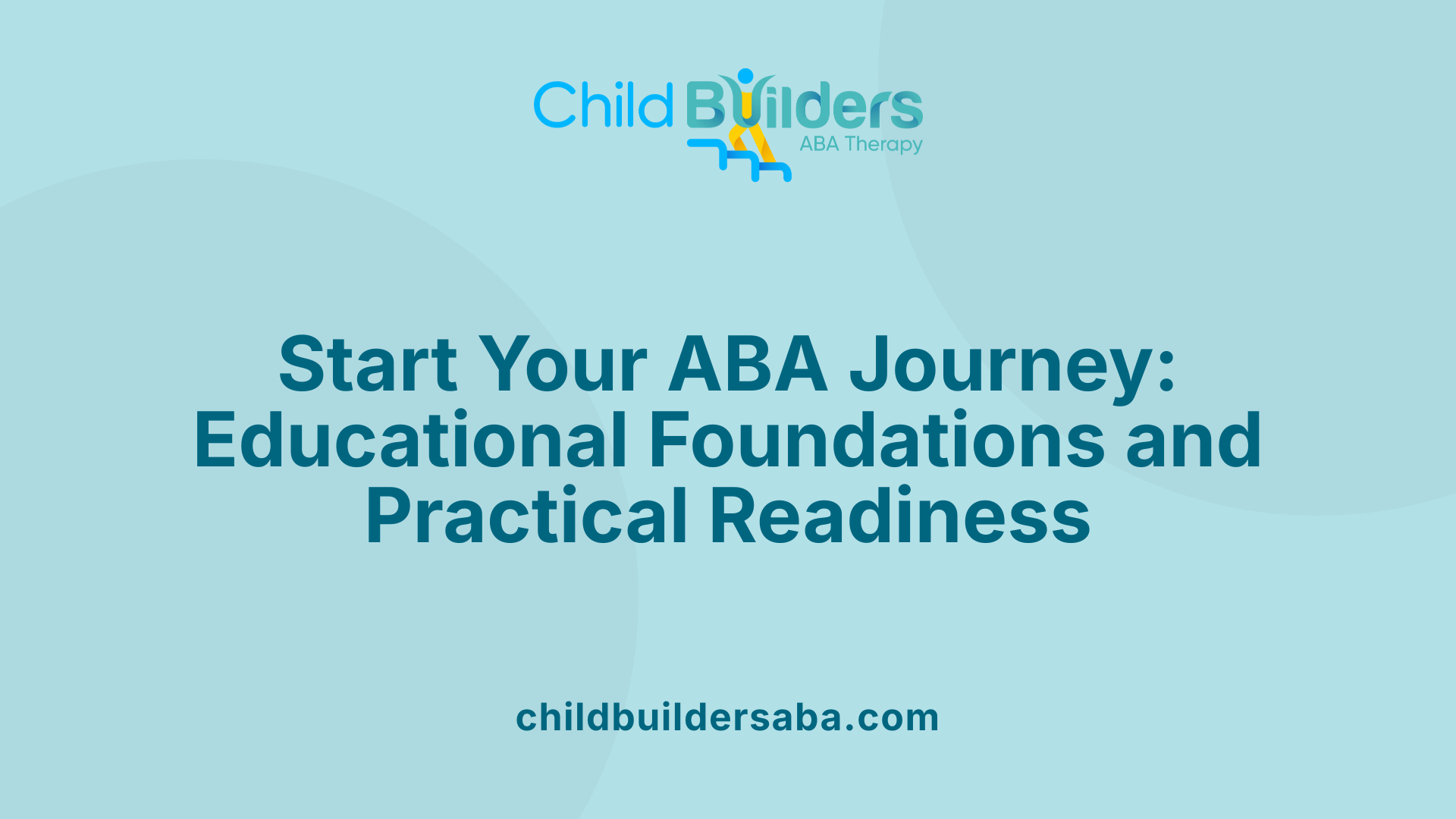
What educational background or readiness tips should aspiring Registered Behavior Technicians focus on?
To become a Registered Behavior Technician (RBT), candidates should meet basic educational requirements which include having a high school diploma or GED. This foundational credential is essential before pursuing specialized training.
A pivotal step is completing a BACB-approved 40-hour training program that covers fundamental ABA principles, ethical considerations, and data collection techniques. This certification ensures candidates are equipped with core knowledge needed for effective practice.
Practical experience is equally important. Aspiring RBTs must successfully demonstrate their skills through a competency assessment overseen by a certified behavior analyst (BCBA). This step validates their ability to apply ABA techniques in real-world settings.
Preparation for the RBT certification exam involves thorough review of the RBT Task List. Many candidates benefit from engaging with mock exams and practice questions that focus on behavior reduction strategies, measurement methods, and ethical standards.
Developing a structured study plan helps organize preparation efforts. Understanding the exam format and engaging in role-playing scenarios can improve confidence and performance.
By focusing on these educational and practical readiness steps, aspiring RBTs can position themselves for successful certification and a rewarding career in behavior analysis.
Strategic Preparation for RBT Interviews: Tips & Techniques
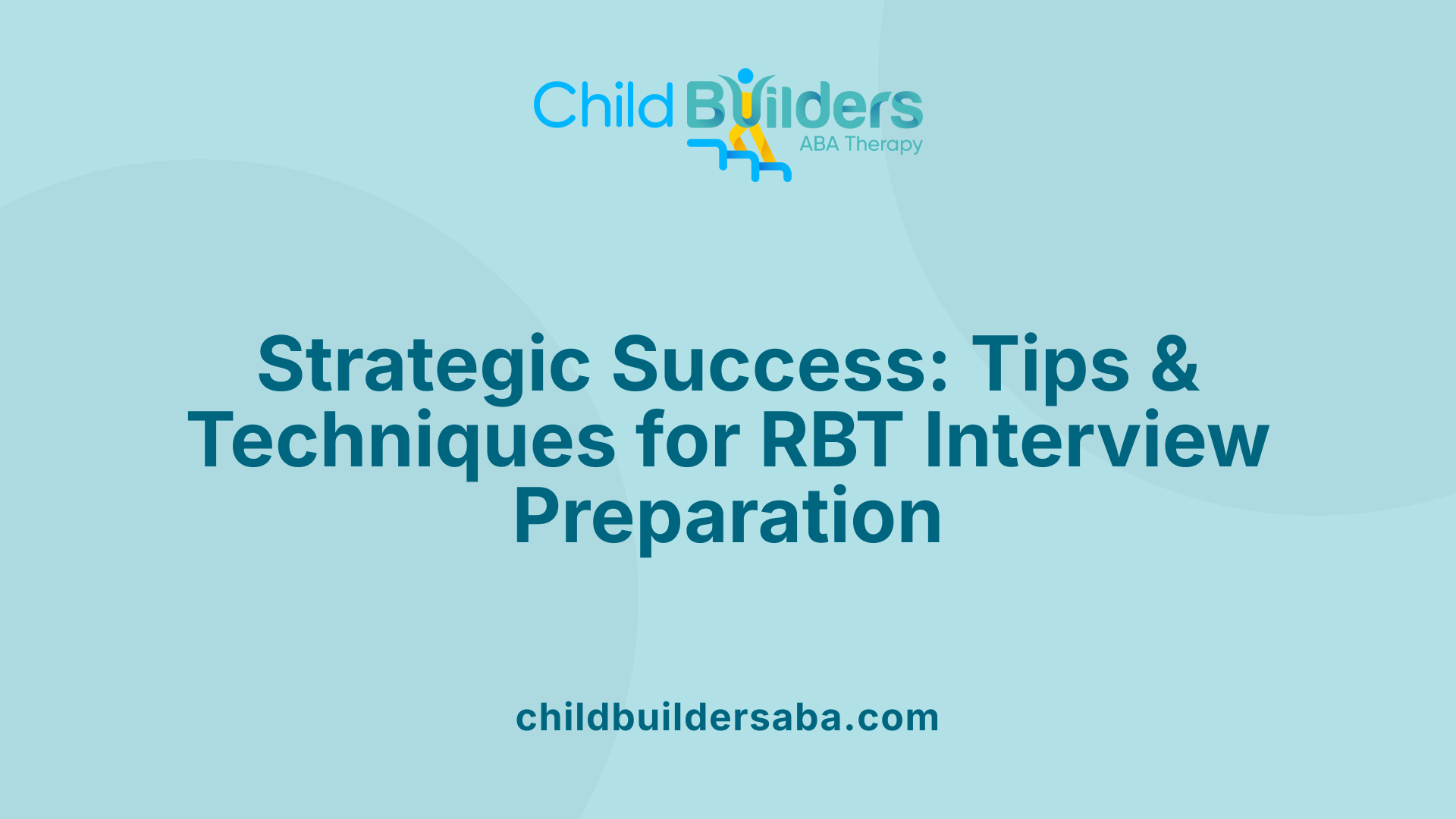 When preparing for a Registered Behavior Technician (RBT) interview, it’s essential to approach each stage with thoroughness and confidence.
When preparing for a Registered Behavior Technician (RBT) interview, it’s essential to approach each stage with thoroughness and confidence.
Start by deeply researching the organization, such as BlueSprig, and understanding their approach to ABA therapy. Be familiar with their emphasis on ethical standards, tailoring interventions, and team collaboration. Knowing the company’s values and treatment philosophies helps you align your responses and demonstrates genuine interest.
Practicing answers for common interview questions is crucial. Prepare to discuss your experience with children with autism and how you apply ABA principles like reinforcement, extinction, and behavior management strategies in real situations. Think of specific examples where you successfully handled challenging behaviors or collaborated effectively with families and teams.
Stay prepared to answer technical questions related to behavior intervention plans, data collection methods, and assessment tools. You may be asked to explain how you design and implement behavior plans, showcasing both your theoretical knowledge and hands-on skills.
It's also important to prepare thoughtful questions for your interviewer. Inquire about training opportunities, team dynamics, workload expectations, and ongoing professional development. This shows your motivation to grow and contribute meaningfully.
Lastly, review foundational concepts of ABA and relevant fields like psychology and social work. Exploring alternative careers in ABA can expand your understanding of the field and help you confidently navigate a variety of interview scenarios.
By combining research, practice, and curiosity, you can enhance your readiness and stand out as a well-prepared candidate for an RBT role.
Key Questions and Ideal Responses in RBT Interviews
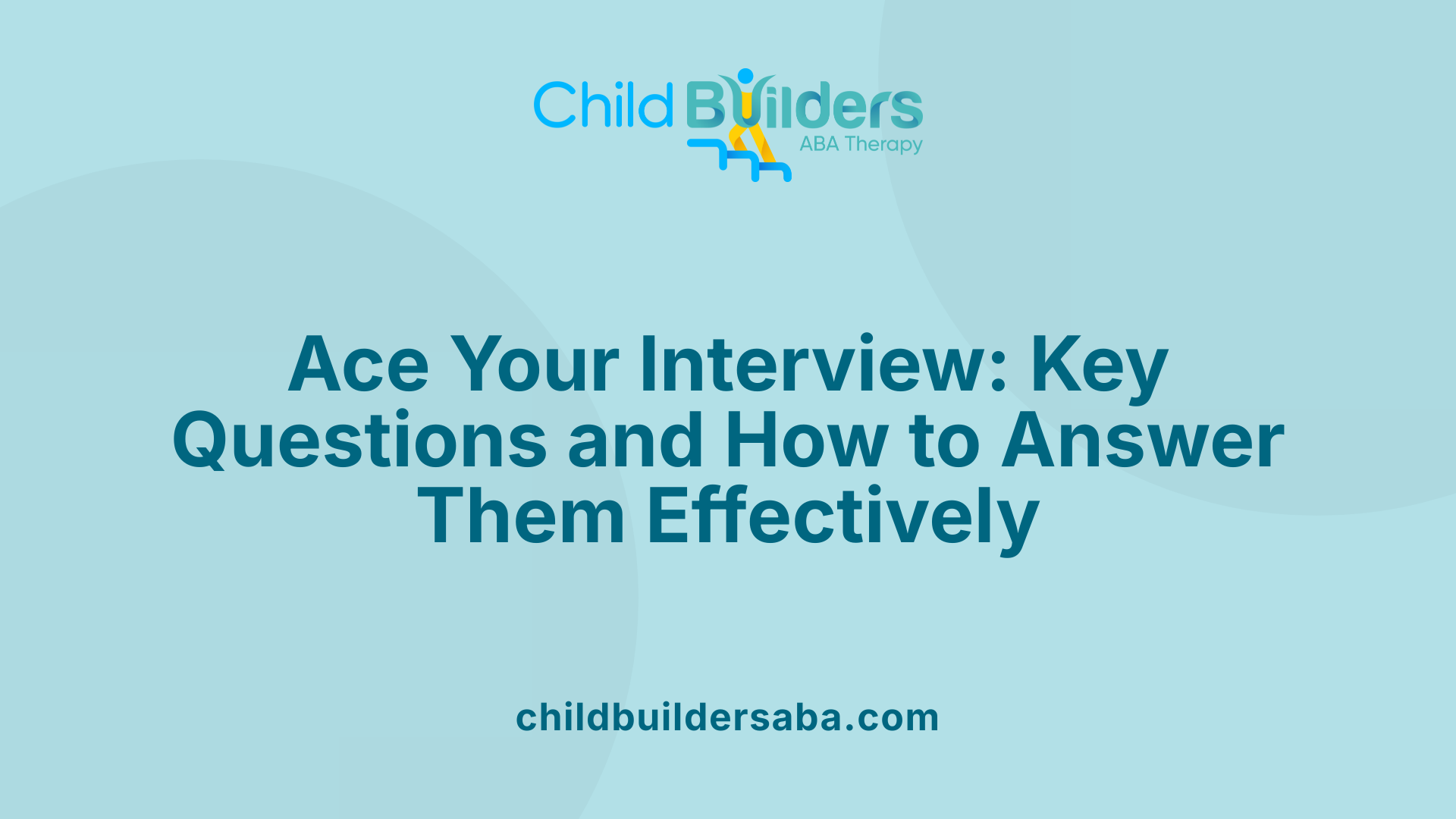
What are common questions asked during an RBT interview and how should I answer them?
In an interview for a Registered Behavior Technician (RBT) position, candidates can expect a range of questions designed to evaluate their understanding of Applied Behavior Analysis (ABA), their practical experience, and their soft skills.
Common interview questions often cover:
- Experience working with children with autism
- Knowledge of ABA principles
- Handling challenging behaviors
- Developing and implementing behavior intervention plans
- Data collection and assessment techniques
- Collaborating with families and treatment teams
- Staying updated on best practices and ethical standards
Sample answers should highlight:
- Detailed explanations of ABA techniques you have used
- Examples of how you've managed difficult behaviors
- Your approach to designing personalized intervention strategies
- Ways you coordinate with other professionals and family members
- Your commitment to ongoing education and adherence to ethical guidelines
Behavioral questions may explore situations where you demonstrated teamwork, communication, empathy, and problem-solving.
Preparation is crucial:
- Review the company's values and specific approaches
- Practice clear, concise responses
- Prepare examples that showcase your practical skills and compassionate approach
By demonstrating a solid understanding of ABA, practical experience, and soft skills, you can confidently showcase your suitability for an RBT role. Remember, the interview is also an opportunity for you to assess if the organization aligns with your professional goals and values.
Key Skills and Competencies Assessed in RBT Interviews
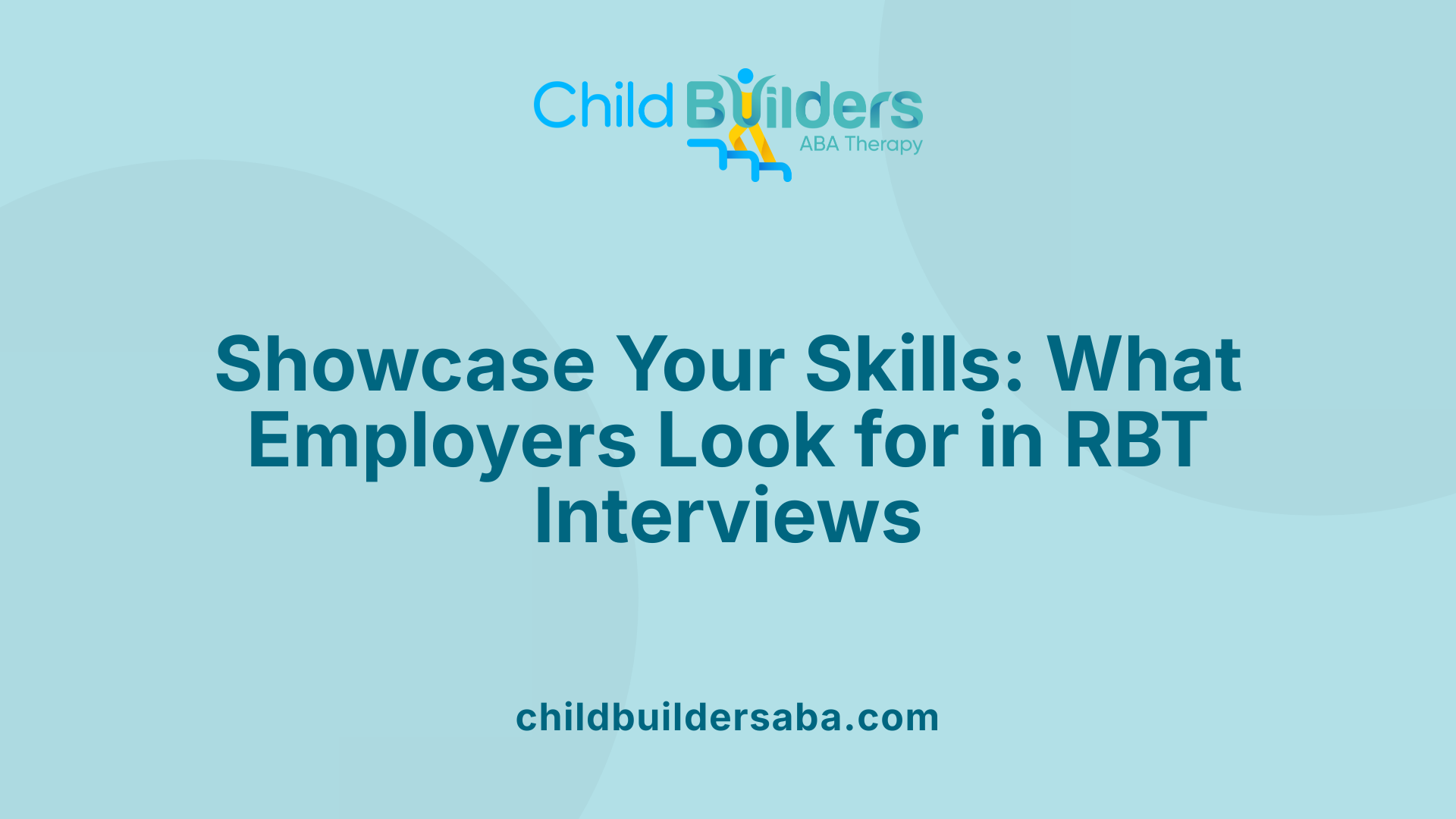
What skills and competencies are typically assessed during an RBT interview?
During an interview for an Autism Behavior Technician (RBT) position, candidates can expect a thorough evaluation of their technical knowledge and practical skills related to applied behavior analysis (ABA). Interviewers focus on understanding how well candidates grasp core ABA concepts such as reinforcement, punishment, prompting, and data collection methods.
Practical application is equally important, with questions likely centered on designing and implementing behavior intervention plans, managing challenging behaviors effectively, and employing positive reinforcement techniques. Candidates should demonstrate their familiarity with behavioral assessment tools and their capability to adapt interventions to meet individual needs.
Communication skills, both verbal and nonverbal, are also assessed, along with the ability to build rapport with clients and collaborate with families and team members. Soft skills like teamwork, confidentiality, and adaptability are critical for success in this role.
Since staying current with industry trends and ethical standards is vital, interviewers may inquire about ongoing education efforts and familiarity with the latest practices in behavior analysis. Overall, the interview aims to determine whether candidates possess the necessary blend of technical expertise, practical experience, and personal qualities to thrive in a behavioral health setting.
Resources, Sample Questions, and Final Tips for RBT Candidates
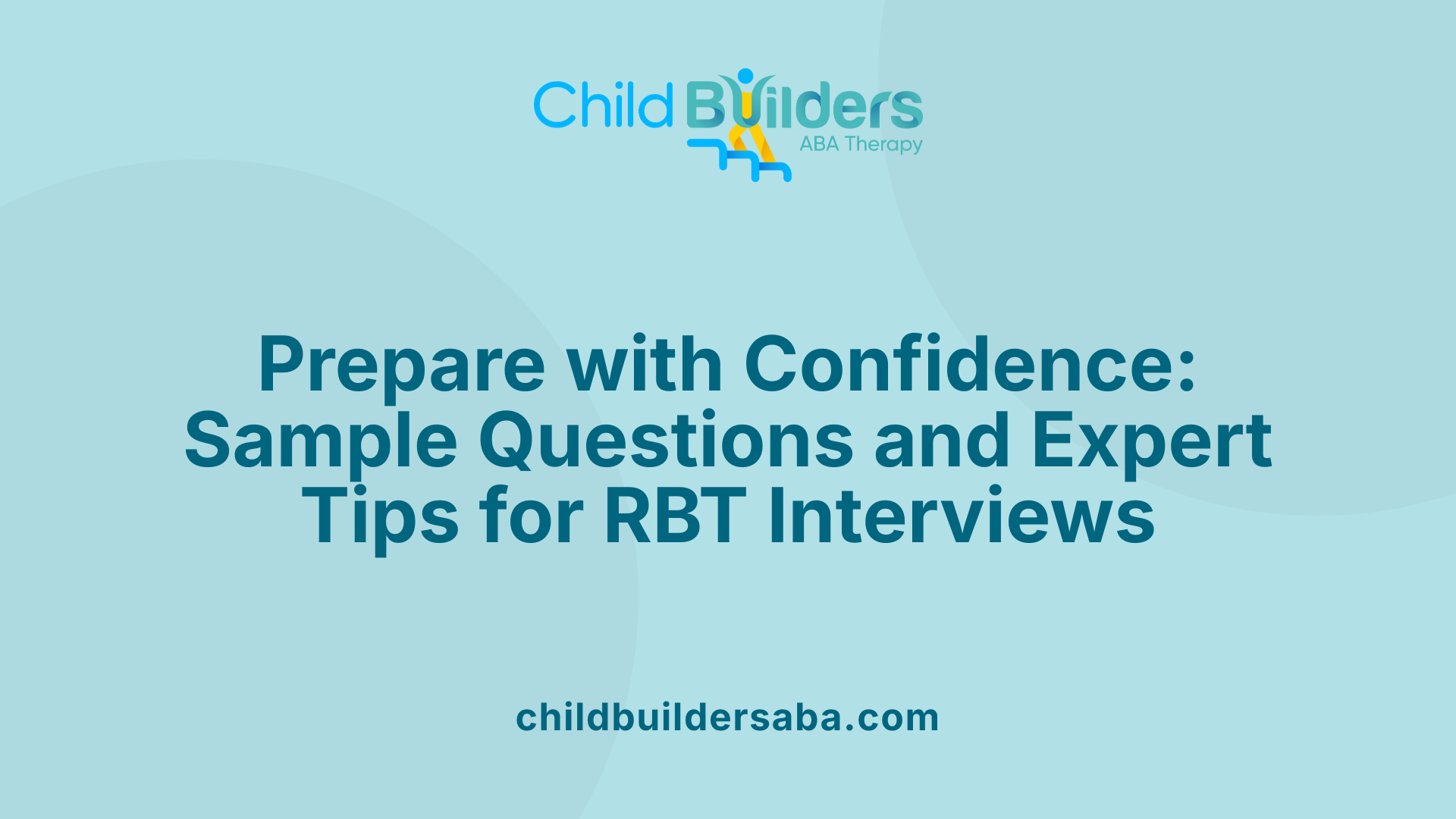
Are there sample questions and model answers available for RBT interview scenarios?
Yes, many preparation tools provide a wide range of sample questions and model answers tailored specifically for Registered Behavior Technician (RBT) interviews. These resources typically cover common topics such as experience with children with autism, understanding of ABA principles, handling challenging behaviors, and working with families.
Sample questions often include technical inquiries about behavior intervention plans, data collection methods, and assessment techniques. Additionally, behavioral and situational questions assess soft skills like teamwork, communication, and problem-solving.
Model answers serve as guides to help candidates craft thoughtful, clear, and comprehensive responses. They illustrate what interviewers prioritize and demonstrate how to effectively showcase your knowledge and practical skills. Many resources also include downloadable PDFs, links to practice questions, and industry tips, all designed to boost your confidence and prepare you thoroughly for your interview.
Utilizing these materials can make a significant difference in landing a role at organizations like BlueSprig, which values a solid understanding of ABA principles, ethical standards, and individualized intervention strategies. Preparing with these questions and answers gives candidates a distinct advantage by practicing how to articulate their experience, skills, and dedication to the field.
Empowering Your RBT Journey
Successfully navigating the RBT interview process involves a combination of technical knowledge, practical experience, and effective communication. By understanding core ABA principles, preparing tailored responses, and researching the organization thoroughly, candidates can present themselves as confident and prepared professionals. Emphasizing ongoing education, demonstrating soft skills such as teamwork and empathy, and utilizing resourceful practice materials will further enhance your chances of securing your desired position. Remember, a well-prepared candidate not only answers questions effectively but also shows genuine passion for making a positive difference in clients' lives. Your dedication combined with strategic preparation can open the door to a rewarding career as a Registered Behavior Technician.
References
- 6 Autism Behavior Technician Interview Questions | NADP
- ABA Therapy Interviews: Top Questions and Advice from BCBAs
- Top 31 Registered Behavior Technician Interview Questions and ...
- ABA Therapy Interviews: Top Questions and Advice from BCBAs
- Interview Preparation for RBTs - 40 Hour RBT® Online Training
- ABA Therapy Interviews: Top Questions and Advice from BCBAs
- RBT Interview: Questions and Answers, Tips, Strategies - Astra ABA
- Registered Behavior Technician Interview Questions & Answers
- How to Prepare for an ABA Job Interview: 7 ABA Interview Questions





.jpg)































































































